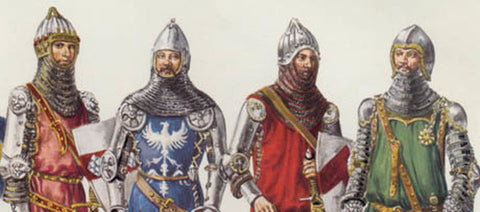14th CENTURY SURCOATS
.
As early as the 12th Century it was customary for noblemen to wear a surcoat on top of their armor. Evidence of this can be found on the Seal of King John who reigned from 1189 to 1199. The purpose of the surcoat would have been to protect the knight from the elements. In images from the reign of Richard II Archers are shown wearing surcoats made from leather which they called Jacques. This was the origin for the modern word jacket. Over time knights began to embroider the family coat of arms on to the surcoats in silk as a means of identification, and to show their place in the hierarchy of society at the time. This custom of showing the coats of arms on the surcoats appears to have become commonplace by the end of the thirteenth Century.
Gilbert de Clare, the Earl of Gloucester was taken prisoner as an enemy combatant at the Battle of Bannockburn in 1314 after forgetting to put on his surcoat with the identifying coat of arms. By the mid fourteenth Century the full length surcoat had been shortened to waist length as a practical measure and this became the standard for the remainder of the Middle Ages.

GILBERT DE CLARE





